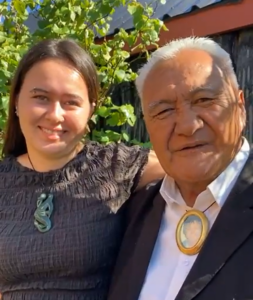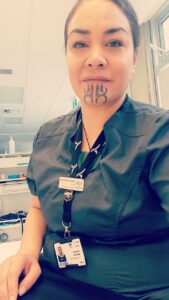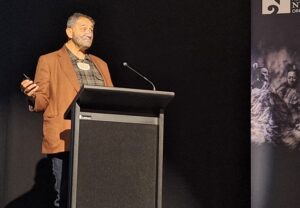
Today Ngāti Toa Rangatira, the mana whenua where the programme is located in Porirua, welcomed with a pōwhiri almost 100 aspiring first-year students onto Takapuwahia Marae – the biggest intake the institute has ever had for the BN Māori.
Since the course was born in 2009, it has taught students the same as other nursing degree courses throughout the country, but with another cultural layer that dives deep into te ao Māori and Māori health issues.
Jeanette Grace (Ngāti Toa, Ngāti Tuwharetoa, Ngāti Koata), dean of Whitireia’s Te Wānanga Māori school, told the students at the pōwhiri that they can expect to come out of the programme not just as qualified nurses but nurses who are “critical thinkers, politically astute who challenge institutional racism and the health inequities facing their people”.

“To the whānau of our new students who’ve come today – we thank you for giving us your whakapapa. We will look after them and when they’ve finished their mahi on this course, we will return them to you with more skills and knowledge that’ll benefit your whānau, hapū and communities.”
Rolleston (Ngai Te Rangi, Te Arawa) travelled more than 500km from Tauranga to the pōwhiri to support his granddaughter Mina Fields-Rolleston who has been accepted onto the course.
Rolleston spoke of the importance to grow the Māori nurse workforce.
“I’ve worked in the health system and it can be very scary for Māori patients. Seeing Māori working as nurses and doctors does make things less difficult for them.
‘I’ve come here to give Whitireia my mokopuna – the taonga of our whānau. We support her to become not just a nurse but a warrior nurse who is just as good with the clinical as she is with the cultural.’
The 22-year-old has moved from Hamilton to do the three-year course.
“In the Waikato I worked at a kaupapa Māori health service and I could see the need for more Māori nurses. The nurses there inspired me to take this leap. I’m excited and hungry to learn everything it takes to be a nurse,” said Mina.
Grace said about 100 applications for year one of the course had been received and 62 had been approved.
“We still have a few applications to process and interviews to do today and tomorrow.
“From the kōrero we’ve had with the applicants so far, there’s a common drive. And that is them wanting to help make a positive difference for their people. They know things aren’t good out there for Māori and they want to help and be part of the solution.”

Mereruia Rikihana (Ngāti Raukawa ki te Tonga, Ngāti Konohi), a teacher on the course, described the massive turnout as “a great day for nursing and the nation”.
“So many of these new students have picked up their families, their kids and moved here to study on this course, because it is unique and well established.”
While Māori make up about 17 per cent of the country’s population, they only make up seven per cent of the country’s nursing workforce, said NZNO kaiwhakahaere Kerri Nuku.
“We need culturally safe staffing ratios and to achieve that, we need more Māori nurses. The less Māori we have to support Māori patients, the more likely they are to turn up with multiple comorbidities.”
Since its inception 16 years ago, the Whitireia course has had the backing of the Wellington region’s two iwi – Ngāti Toa and Te Āti Awa / Taranaki whanui.

Taranaki whanui leader Kura Moeahu recently told hundreds of practising nurses at the indigenous nurses Aotearoa conference that his iwi saw the dire need for more Māori nurses and that was why they partnered with Whitireia.
“Our iwi services are crying out for more Māori nurses. So it is in our interests to ensure these students stay the course and that’s why we manaaki and support them with pastoral care, equipment, kai and travel.”
The new students start their course on Monday.



